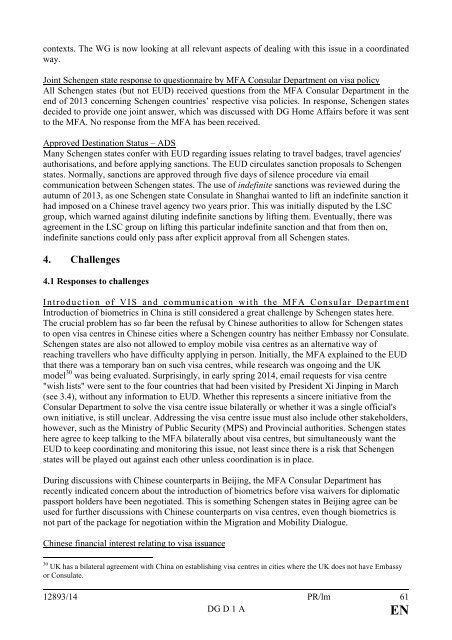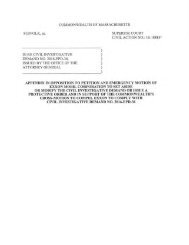eu-com-schengen-coop
eu-com-schengen-coop
eu-com-schengen-coop
You also want an ePaper? Increase the reach of your titles
YUMPU automatically turns print PDFs into web optimized ePapers that Google loves.
contexts. The WG is now looking at all relevant aspects of dealing with this issue in a coordinated<br />
way.<br />
Joint Schengen state response to questionnaire by MFA Consular Department on visa policy<br />
All Schengen states (but not EUD) received questions from the MFA Consular Department in the<br />
end of 2013 concerning Schengen countries’ respective visa policies. In response, Schengen states<br />
decided to provide one joint answer, which was discussed with DG Home Affairs before it was sent<br />
to the MFA. No response from the MFA has been received.<br />
Approved Destination Status – ADS<br />
Many Schengen states confer with EUD regarding issues relating to travel badges, travel agencies'<br />
authorisations, and before applying sanctions. The EUD circulates sanction proposals to Schengen<br />
states. Normally, sanctions are approved through five days of silence procedure via email<br />
<strong>com</strong>munication between Schengen states. The use of indefinite sanctions was reviewed during the<br />
autumn of 2013, as one Schengen state Consulate in Shanghai wanted to lift an indefinite sanction it<br />
had imposed on a Chinese travel agency two years prior. This was initially disputed by the LSC<br />
group, which warned against diluting indefinite sanctions by lifting them. Eventually, there was<br />
agreement in the LSC group on lifting this particular indefinite sanction and that from then on,<br />
indefinite sanctions could only pass after explicit approval from all Schengen states.<br />
4. Challenges<br />
4.1 Responses to challenges<br />
Introduction of VIS and <strong>com</strong>munication with the MFA Consular Department<br />
Introduction of biometrics in China is still considered a great challenge by Schengen states here.<br />
The crucial problem has so far been the refusal by Chinese authorities to allow for Schengen states<br />
to open visa centres in Chinese cities where a Schengen country has neither Embassy nor Consulate.<br />
Schengen states are also not allowed to employ mobile visa centres as an alternative way of<br />
reaching travellers who have difficulty applying in person. Initially, the MFA explained to the EUD<br />
that there was a temporary ban on such visa centres, while research was ongoing and the UK<br />
model 30 was being evaluated. Surprisingly, in early spring 2014, email requests for visa centre<br />
"wish lists" were sent to the four countries that had been visited by President Xi Jinping in March<br />
(see 3.4), without any information to EUD. Whether this represents a sincere initiative from the<br />
Consular Department to solve the visa centre issue bilaterally or whether it was a single official's<br />
own initiative, is still unclear. Addressing the visa centre issue must also include other stakeholders,<br />
however, such as the Ministry of Public Security (MPS) and Provincial authorities. Schengen states<br />
here agree to keep talking to the MFA bilaterally about visa centres, but simultaneously want the<br />
EUD to keep coordinating and monitoring this issue, not least since there is a risk that Schengen<br />
states will be played out against each other unless coordination is in place.<br />
During discussions with Chinese counterparts in Beijing, the MFA Consular Department has<br />
recently indicated concern about the introduction of biometrics before visa waivers for diplomatic<br />
passport holders have been negotiated. This is something Schengen states in Beijing agree can be<br />
used for further discussions with Chinese counterparts on visa centres, even though biometrics is<br />
not part of the package for negotiation within the Migration and Mobility Dialogue.<br />
Chinese financial interest relating to visa issuance<br />
30 UK has a bilateral agreement with China on establishing visa centres in cities where the UK does not have Embassy<br />
or Consulate.<br />
12893/14 PR/lm 61<br />
DG D 1 A<br />
EN












